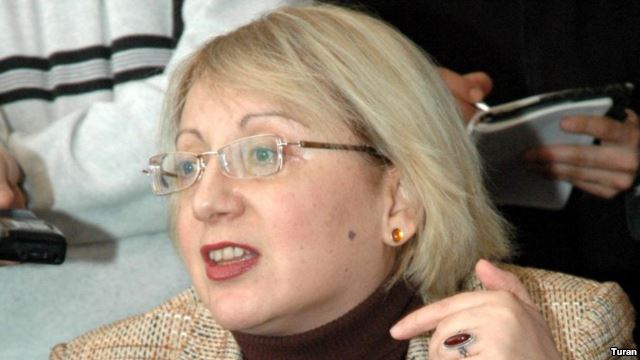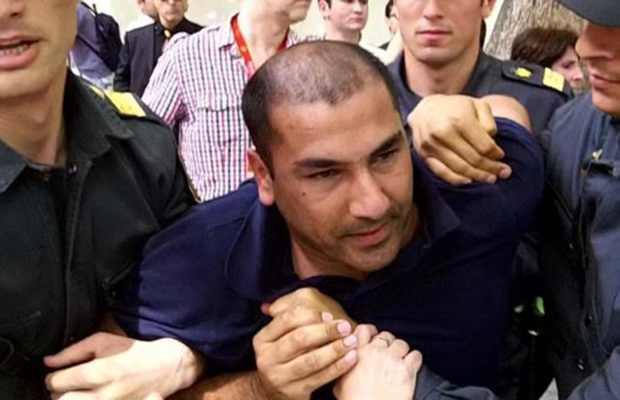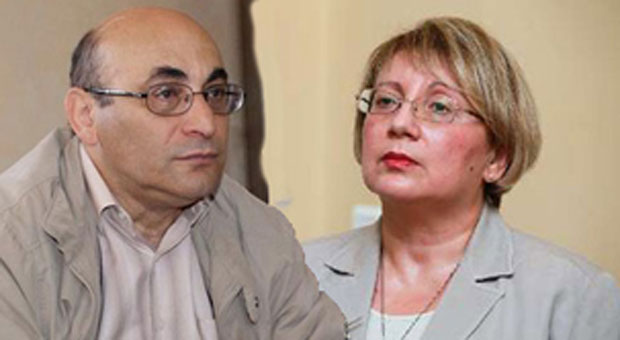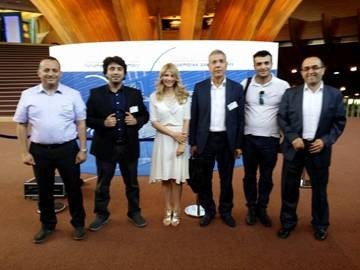6 Nov 2014 | Azerbaijan, Azerbaijan News, Europe and Central Asia, News and features

Two lawyers representing Azerbaijani human rights activist Leyla Yunus’s have been dismissed from her case. Javad Javaldi announced his suspension on 29 October, followed by Khalid Bagirov on 5 November. This comes as Azerbaijan’s ambassador to the United Kingdom says the government is “deeply committed” to strengthening its cooperation with the country’s civil society.
The prosecutor general’s office has not provided explanations for the suspensions. They have also prevented Bagirov from meeting with his client Rasul Jafarov, another prominent Azerbaijani human rights activist currently imprisoned.
The lawyers’ dismissal comes less than two weeks after Yunus said she had been denied access to her lawyers. In late September, her lawyers expressed concern at being unable to meet with Yunus in person or speak on the phone with her, saying they were concerned about her physical wellbeing. She has reportedly been beaten by both guards and her cellmate and denied medical attention.
The court has also reportedly extended Yunus’s detention until 28 February. She was initially arrested on July 30 with her husband, Arif, who recently had his pretrial detention extended until 5 March. The two are charged with high treason, spying for Armenia, illegal business activities, document forgery and fraud.
Both detention extensions go against calls from the European Parliament to Azerbaijan to release political prisoners and reform human rights. Last month the European Union praised President Ilham Aliyev when he announced he would release 80 prisoners, including some human rights activists.
Thorbjørn Jagland, secretary general of the Council of Europe and chair of the Norwegian Nobel Committee, wrote on Monday that Azerbaijan has been “repeatedly warned…over its poor human rights record”.
In a response to Jagland, Ambassador Tahir Taghizadeh wrote in a letter in The Guardian on Thursday that his country has “come a long way in strengthening democracy and human rights over the last 23 years.” He added that “there still exists a long way to go,” and the government looks forward to working with civil society to resolve “human rights issues”.
This article was originally posted on 6 November at indexoncensorship.org
4 Nov 2014 | Azerbaijan, Azerbaijan News, Azerbaijan Statements, News and features, Statements

In the latest example of Azerbaijan’s crackdown on independent media, Khalid Garayev was detained by police on Oct 30, 2014.
On 30 October a Baku court sentenced opposition journalist Khalid Garayev to 25 days in detention on trumped-up charges of hooliganism and disobeying the police, dealing a new blow to Azerbaijan’s independent media at a time when its civil society is being subjected to an unprecedented crackdown.
A reporter for the leading opposition daily Azadliq, which was named the 2014 Index on Censorship Freedom of Expression Journalism award winner, and producer of “Azerbaycan Saati,” a TV programme linked to the newspaper that is broadcast by satellite from abroad, Garayev was sentenced just a day after his arrest.
Index on Censorship, International Media Support, Freedom House, Media Diversity Institute, Article 19, European Federation of Journalists, WAN-IFRA and Reporters Without Borders – all members of the International Partnership Group on Azerbaijan (IPGA) – call for Garayev’s release on appeal and condemn the witchhunt against journalists who work for Azadliq and “Azerbaycan Saati.”
Arrested on the evening of 29 October in the Baku suburb of Binagadi, Garayev was charged under articles 296 and 310.1 of the Code of Administrative Offences. The indictment said he was heard using vulgar language outside a supermarket in the centre of Binagadi and refused to comply with instructions from the police.
Appearing in court on 30 October, one of the two prosecution witnesses was a person who is apparently systematically used by the police in similar cases. The court rejected the defence’s request to view surveillance camera footage.
The sentence of 25 days in prison is close to the maximum of 30 days for such offences, for which the penalty can be just a fine. Garayev and his lawyer, Bakhruz Bayramov, accused the authorities of fabricating the entire case just to punish Garayev for his journalistic activities.
Azadlig and “Azerbaycan Saati” have long been subjected to harassment. The newspaper, which is being throttled economically, has had to suspend its print edition on several occasions and is now near to closure. Its editor, Ganimat Zahid, spent two and a half years in prison, from November 2007 to March 2010, on similarly trumped-up charges.
Amid mounting repression, the staff of “Azerbaycan Saati” have been singled out in recent months and one of its presenters, Seymour Khazi, has been in pre-trial custody since 29 August and is facing the possibility of three to seven years in prison on a charge of “aggravated hooliganism.”
A colleague, Natig Adilov, fled the country after his brother was arrested in August.
For more information about the crackdown on Azerbaijan’s civil society, read the recent IPGA report “Azerbaijan – when the truth becomes a lie.”
Signatories:
– Article 19
– European Federation of Journalists
– Freedom House
– Index on Censorship
– International Media Support
– Media Diversity Institute
– Reporters Without Borders
– WAN-IFRA
29 Oct 2014 | Azerbaijan, Azerbaijan News, News and features

Arif and Leyla Yunus (Photo: HRHN)
A journalist from Azerbaijani opposition newspaper Azadliq was today sentenced to 25 days of administrative detention. Khalid Garayev, who also hosts online show Azerbaijani Hour, was found guilty of hooliganism and insubordination to the police by a court in the capital Baku. He told the court the case against him is “fabricated, and politically motivated” because of his “journalistic activities and active civil position” reports contact.az.
Also today, jailed human rights activist Leyla Yunus said she has been denied access to her lawyer. Yunus made the claim in a letter sent from the detention centre in Baku where she is being held. This comes a day after her husband Arif Yunus, who was arrested with her in July, had his pretrial detention extended until 5 March, 2015. Azerbaijani authorities also announced yesterday that police will be able to use electric shockers, following an amendment to the police law.
Leyla Yunus’ lawyers have previously reported being denied access to her cell or an opportunity to see her. She has also reportedly been beaten and denied medical attention. The lawyers say the conditions she is being exposed to in prison “raise a lot of concerns”.
In addition to the Yunus couple, rights activist Rasul Jafarov, lawyer Intigam Aliyev and journalist Seymur Hezi have been detained since late this summer.
Last week, the European Union praised an announcement from President Ilham Aliyev that 80 prisoners, including at least four activists, would be granted amnesty. This was “a positive first step in reversing the trend of recent months,” said the EU in a statement.
Previously, the European Parliament has called on Azerbaijan to release political prisoners, including Arif and Leyla Yunus. The parliament also called on the government to cease its harassment of civil society organisations, opposition politicians and independent journalists.
On 13 October, thousands protested in Baku, calling for the resignation of President Ilham Aliyev, the release of political prisoners and an end to human rights abuses in the country. Two days prior, a travel ban had been placed on journalist Khadija Ismayilova. She currently faces a lawsuit over libel and document forgery, accusations she denies. As Index has reported, government supporters have threatened Ismayilova in the past.
Fellow journalist Arzu Geybulla was threatened on social media and accused of treason following a recent interviewed with Azerbaijani news site Modern.az. In July, the Index award-winning newspaper Azadliq was forced to suspend publication due to financial pressure from authorities.
Nominations are now open for the Index Freedom of Expression Awards 2015. Put forward your free expression heroes here.
This article was posted on 29 October 2014 and updated on 30 October at indexoncensorship.org
16 Oct 2014 | Azerbaijan, Azerbaijan Statements, Campaigns, Statements

The Azerbaijani authorities should immediately lift the travel ban imposed on Khadija Ismayilova and cease all legal proceedings against her. Against the backdrop of the unprecedented crackdown on civil society, Khadija Ismayilova’s arrest on criminal defamation charges seems imminent and would confirm the authorities’ intent to silence all critical voices in the country.
As part of the International Partnership Group on Azerbaijan (IPGA), APC, ARTICLE 19, the Committee to Protect Journalists, Index on Censorship, the European Federation of Journalists, Freedom House, Freedom Now, the Human Rights House Foundation, International Media Support, the Media Diversity Institute, PEN International and Reporters without Borders, call on the international community, and in particular Council of Europe member states to immediately and publicly condemn the ongoing harassment and politically motivated criminal charges against Khadija Ismayilova. With the next court hearing taking place on Friday 17 October, at 11.30 in Binagadi district court in Baku, Council of Europe member states should publicly request to attend and send a representative to monitor the hearing.
IPGA members believe that Khadija Ismayilova’s attendance at the most recent session of the Parliamentary Assembly of the Council of Europe (PACE) in Strasbourg triggered the latest string of harassment, including a five hour search upon arrival at the airport following her trip, the criminal defamation charges and the imposition of a travel ban.
“Those who raise concern about the existence of political prisoners in Azerbaijan at the Council of Europe are themselves specifically targeted by the authorities, and such reprisals are incompatible with international human rights standards the Azerbaijani authorities claim to adhere to,” said David Diaz-Jogeix, Director of Programmes of ARTICLE 19.
“The ongoing harassment of one of Azerbaijan’s most outspoken critics follows an unprecedented wave of arrests of human rights defenders, civic activists and journalists in Azerbaijan who have dared to publicly criticise the authorities. Those who have spoken about the issue of political prisoners in Azerbaijan at PACE have been particularly targeted.” said Florian Irminger, Head of Advocacy and Geneva Office at the Human Rights House Foundation (HRHF).
“We are deeply concerned by the increasing persecution of human rights defenders in Azerbaijan and, in particular, continued attempts to stifle free expression through intimidation and harassment of journalists like Khadija Ismayilova and Arzu Geybulla. The international community – and especially the Council of Europe of which Azerbaijan is part – needs to speak out loudly and firmly against the crackdown in Azerbaijan,” stated Jodie Ginsberg, CEO of Index on Censorship.
“Khadija Ismayilova is one of the most recognized investigation journalists in Azerbaijan. Harassing her is sending a clear signal of intimidation to the entire media profession,” Reporters Without Borders deputy programme director Virginie Dangles said.

These six human rights defenders, pictured above from left to right here are:
Zohrab Ismayil: forced to leave Azerbaijan, his NGO, Public Association for Assistance to Free Economy, paralysed
Emin Huseynov: unable to work in Azerbaijan, due to legal action against his NGO, Institute for Reporters Freedom of Safety, subject to travel ban
Gulnara Akhundova: forced to leave Azerbaijan, no longer able to represent her NGO, International Media Support from within the country
Rasul Jafarov: in pre-trial detention on politically motivated charges
Intigam Aliyev: in pre-trial detention on politically motivated charges, unable to take his cases at the European Court for Human Rights forward
Rashid Hajili: forced to stop working as human rights defender, his NGO, Media Rights Institute seized operating
The IPGA calls on the Azerbaijani authorities to cease its harassment of Khadija Ismayilova and stop the silencing of its critics through imprisonment and politically motivated legal actions. Member states of the Council of Europe, the main human rights institution in Europe, need to speak up and hold Azerbaijan to account for failing to implement its human rights obligations. With Azerbaijan as chair of its Committee of Ministers until 14 November, the integrity and accountability of the institution is at stake.
For further information about Khadija Ismayilova, also see the recent IPGA report Azerbaijan – when the truth becomes a lie.





